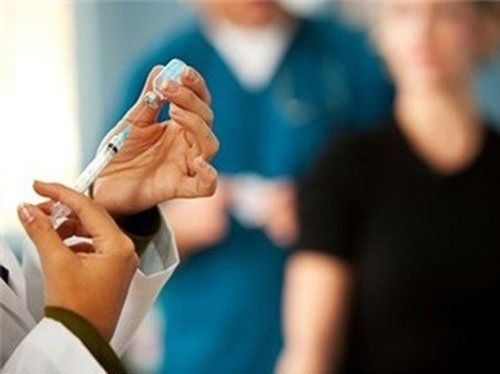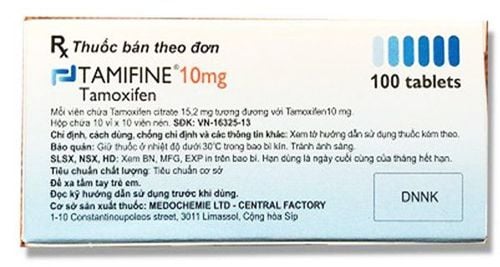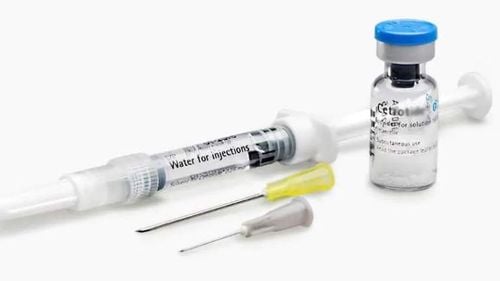This is an automatically translated article.
Infertility in women has many causes, and among them, not ovulating is the leading cause. To overcome this situation can use methods to stimulate ovulation. What is ovulation stimulation?1. What is Ovulation Stimulation?
Infertility is defined when a couple has regular sex for a year, without using any contraceptive method, and still does not get pregnant. Not ovulating (including not ovulating regularly and not ovulating at all) is the most common of the causes of female infertility. Ovulation stimulation is a method of using drugs to stimulate or control ovulation, applied to cases of female infertility due to ovulation disorders.
Kích thích phóng noãn
2. Mechanism and composition of drugs used in ovulation stimulation method
The drugs used in ovulation induction work like the body's natural hormones - follicle stimulating hormone (FSH) and luteinizing hormone - LH), to initiate ovulation. These drugs are also used in women who want to stimulate ovulation for better eggs, to ovulate two or even more eggs in a menstrual cycle. The ingredients of the drugs used in ovulation stimulation methods may contain:Clomiphene citrate: Clomiphene citrate when taken orally stimulates ovulation by acting on the pituitary gland to release more hormones. follicle-stimulating hormone (FSH) and luteal-stimulating hormone (LH), thereby stimulating the growth of follicles in the ovary. Gonadotropin: Instead of stimulating the pituitary gland to release more hormones, gonadotropin is injected directly to stimulate the ovaries to produce more eggs. Gonadotropin pills contain human menopausal gonadotropin (hMG) and follicle-stimulating hormone (FSH). Another type of gonadotropin, human chorionic gonadotropin (hCG) is used to cause the egg to mature and initiate ovulation when the time comes. However, the use of gonadotropins raises concerns about the possibility of multiple pregnancies and preterm birth. Metformin: Metformin is used when insulin resistance is determined or suspected to be the cause of infertility, which is common in women diagnosed with polycystic ovary syndrome (PCOS). Metformin helps improve insulin resistance, thereby improving ovulation. Letrozole: Letrozole is an aromatase inhibitor drug, and has a similar mechanism of action to clomiphene. Letrozole can induce ovulation, however the effect of letrozole on early pregnancy is unknown, so it is not used as much as other medications. Bromocriptine: bromocriptine, a dopamine agonist, can be used in cases where the problem with ovulation is too much prolactin secreted by the pituitary gland.

Thuốc được sử dụng trong phương pháp kích thích phóng noãn
3. Risks when using drugs in the method of ovulation stimulation
As with any other treatment, there are some risks associated with using these drugs:Multiple pregnancy: the risk of multiple pregnancy with oral medications is relatively low (less than 10 years). %), and in the case of multiple pregnancies, it is mainly a twin pregnancy. However, the risk of multiple pregnancy with the injection increases up to 30%, and in the case of multiples there is a higher risk of becoming pregnant with triplets or even more triplets. In fact, the more multiple you are pregnant, the more likely you are to have a premature birth, have a low birth weight baby, and have developmental problems later in life. If too many follicles develop, adjusting the medication can help lower the risk of a multiple pregnancy. Ovarian hyperstimulation syndrome (OHSS): Injections that stimulate ovulation can cause ovarian hyperstimulation syndrome, which causes swelling and pain in the ovaries. Signs and symptoms often go away on their own without treatment, most commonly mild abdominal pain, bloating, nausea, vomiting, and diarrhea. However, if you are pregnant, symptoms can last up to several weeks. More rarely, it can progress to a more serious form of ovarian hyperstimulation syndrome, which causes rapid weight gain, painfully enlarged ovaries, ascites, and difficulty breathing. Long-term risk of developing ovarian tumors: Most studies show that women who use ovarian stimulation drugs face low rates of long-term risks. However, there is some research that shows that women who have used ovarian stimulation drugs for 12 months or more and still have not had a successful pregnancy may have an increased risk of developing ovarian tumors later in life. For women who have never been pregnant, the risk of developing ovarian tumors is also increased, and this is most likely due to an underlying problem, not necessarily the treatment. Established in November 2014, Vinmec IVF Fertility Center has provided fertility support to more than 1000 infertile couples with a clinical pregnancy rate of over 40%. This is the same rate as developed countries such as the US, UK, Australia...
Reproductive techniques performed at Vinmec IVF Center are performed by a team of doctors, Highly qualified experts with extensive experience, capable of synchronously and comprehensively deploying the most advanced assisted reproductive techniques today, helping to realize the dream of becoming a parent of hundreds of families. all over Vietnam.
Please dial HOTLINE for more information or register for an appointment HERE. Download MyVinmec app to make appointments faster and to manage your bookings easily.
Articles refer to the source: mayoclinic.org













